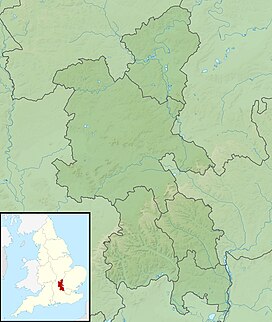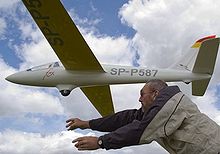Ivinghoe Beacon
| Ivinghoe Beacon | |
|---|---|
Ivinghoe Beacon, looking north from the Ridgeway | |
| Highest point | |
| Elevation | 233 m (764 ft) |
| Coordinates | 51°50′31″N 0°36′21″W / 51.841985°N 0.605755°WCoordinates: 51°50′31″N 0°36′21″W / 51.841985°N 0.605755°W |
| Geography | |
 Ivinghoe Beacon Ivinghoe Beacon shown within Buckinghamshire | |
| Location | Ivinghoe |
| Parent range | Chiltern Hills |
| OS grid | SP961168 |
Ivinghoe Beacon is a prominent hill and landmark in Buckinghamshire, England, 233 m (757 ft) above sea level[1] in the Chiltern Hills, close to Ivinghoe and Aldbury. Dunstable, Berkhamsted and Tring are nearby.
The Beacon lies within the Ashridge Estate and is managed and owned by the National Trust.[2][3] It is the starting point of the Icknield Way to the east, and the Ridgeway long-distance path to the west.

Ivinghoe Beacon is a popular spot for walkers and sightseers. Model aircraft enthusiasts also use lift generated by the wind blowing up the hill to fly their unpowered aircraft – a technique known as slope soaring.[4]
History[]
The hill is an ancient signal point, which was used in times of crisis to send messages across long distances. It is also the site of an early Iron Age hill fort.
Archaeological evidence has revealed human activity dating back to the Bronze Age, and the area contains many Scheduled Ancient Monuments, including a number of Bronze Age burial mounds and the faint remains of an Iron Age hill fort at the top of the hill. There also exists evidence of ancient farming as the Beacon is also crossed by deep channels which are thought to be cattle drovers' paths and cross-ridge dykes. The prehistoric earthwork, Grim's Ditch passes to the south of the Beacon at Incombe Hole.
Nature[]
Ivinghoe Beacon is part of the Ivinghoe Hills Site of Special Scientific Interest[5][6] and this area forms part of the Chilterns Area of Outstanding Natural Beauty (AONB).
The chalk grassland supports a range of wildlife. A number of wild flower species grow on the Beacon such as rare types of wild orchid and pasque-flower, and these support endangered butterfly species such as the Duke of Burgundy.
Filming location[]
Ivinghoe Beacon's appearance of remoteness, yet relative proximity to the film studios at Elstree and Leavesden, has made it a popular choice as a filming location. It has been used as a location for many dramas, especially those produced by ITC in the 1960s.[citation needed]
The Beacon has been used as a filming location in four Harry Potter films – Harry Potter and the Goblet of Fire, Harry Potter and the Half-Blood Prince, and Harry Potter and the Deathly Hallows – Part 1 and Part 2.[7] The Beacon also appeared in the 2012 BBC adaptation of Richard II.[8] In 2018 film crews shot scenes on Ivinghoe Beacon for the Star Wars movie The Rise of Skywalker.[9]
References[]
- ^ http://benchmarks.ordnancesurvey.co.uk/pls/htmldb/f?p=111:12:6255072357299077241::NO::P12_TRIG_STATION_ID:14576
- ^ "Ivinghoe Beacon at Ashridge Estate". National Trust. Retrieved 23 July 2019.
- ^ "Map categories: Ivinghoe Beacon". www.chilternsaonb.org. The Chilterns AONB. Retrieved 23 July 2019.
- ^ Those wishing to participate in model flying at the Beacon should review and comply with the agreement between the National Trust and the Ivinghoe Soaring Association.
- ^ "Ivinghoe Hills citation" (PDF). Sites of Special Scientific Interest. Natural England. Retrieved 30 July 2020.
- ^ "Map of Ivinghoe Hills". Sites of Special Scientific Interest. Natural England. Retrieved 30 September 2015.
- ^ Miller, C. D. (2012). Harry Potter Places: Snitch-Seeking in Southern England and Wales. First Edition Design Pub. ISBN 9781937520984. Retrieved 23 July 2019.
- ^ "Harry Potter returns to... the Leighton area". www.leightonbuzzardonline.co.uk. Retrieved 23 July 2019.
- ^ "Ivinghoe Beacon part of the Star Wars universe?". Mix 96. UKRD. 24 August 2018. Archived from the original on 17 April 2019. Retrieved 17 April 2019.
External links[]
| Wikimedia Commons has media related to Ivinghoe Beacon. |
- Ivinghoe Soaring Association - Controls model slope soaring off Ivinghoe Beacon.
- Ivinghoe Beacon, Bucks Earth Heritage Group
- Hills of Buckinghamshire
- Chiltern Hills
- Ashridge
- Ivinghoe
